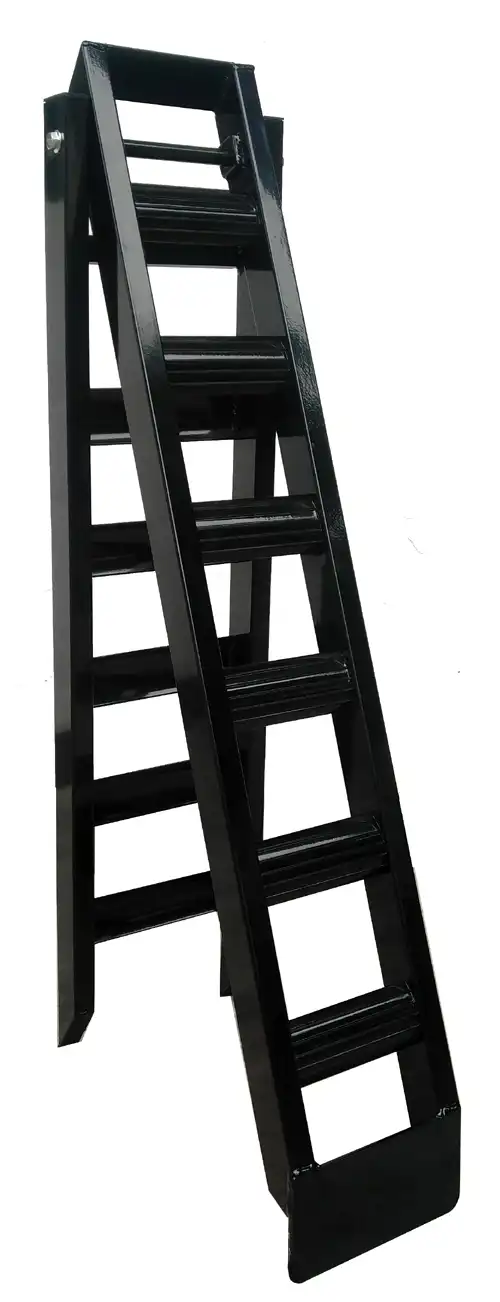Understanding the Key Features of Motorcycle Ramps
Weight Capacity and Durability
When selecting a motorcycle ramp, one of the most critical factors to consider is its weight capacity. Ensure the ramp can support not only your bike's weight but also provide a safety margin. High-quality motorcycle loading ramps are typically constructed from sturdy materials like aluminum or steel, offering a balance between strength and lightweight design. Aluminum ramps are popular due to their corrosion resistance and portability, while steel ramps may offer higher weight capacities for heavier motorcycles.
Length and Incline Angle
The length of your motorcycle ramp directly affects the loading angle, which is crucial for safe and easy loading. A longer ramp provides a gentler incline, making it easier to walk your bike up or ride it if necessary. The ideal length depends on the height difference between your loading surface and the ground. As a general rule, aim for an incline angle of 15 degrees or less. This ensures a comfortable and secure loading process, especially for sports bikes or custom motorcycles with low ground clearance.
Width and Stability
The width of your moto ramp is another essential consideration. A wider ramp offers more stability and makes it easier to walk alongside your motorcycle during loading. Some ramps come in single-piece designs, while others feature multi-piece configurations that can be adjusted for different widths. Consider your bike's tire width and your comfort level when choosing between narrow and wide ramps. Additionally, look for ramps with side rails or raised edges, which provide extra security and prevent accidental roll-offs during the loading process.
Advanced Features and Safety Considerations
Surface Traction and Grip
The surface of your motorcycle ramp plays a crucial role in ensuring a safe loading process. Look for ramps with anti-slip surfaces, such as serrated rungs or textured coatings. These features provide excellent traction for your motorcycle's tires, even in wet conditions. Some high-end ramps incorporate additional grip elements like rubber inserts or specialized tread patterns. Remember that while a smooth surface might seem easier to clean, it can become dangerously slippery when wet or oily, potentially leading to accidents during loading or unloading.
Foldability and Storage
For riders who frequently transport their motorcycles, a foldable ramp offers significant advantages. These designs allow for easy storage in your truck bed or garage when not in use. Look for ramps with smooth folding mechanisms and secure locking systems to prevent unintended deployment. Some models even come with carrying handles or storage bags for added convenience. When considering foldable options, ensure that the folding mechanism doesn't compromise the ramp's strength or stability when in use.
Safety Straps and Attachment Points
Many quality motorcycle loading ramps come equipped with safety straps or attachment points. These features allow you to secure the ramp to your vehicle or loading platform, preventing it from slipping or shifting during use. Some ramps include built-in hooks or plates that attach to your truck's tailgate or trailer edge. Others may have pre-drilled holes for attaching safety chains. Always use these safety features as directed by the manufacturer to ensure maximum stability and security during the loading process.
Choosing the Right Ramp for Your Specific Needs
Assessing Your Motorcycle Type
Different types of motorcycles may require specific ramp features. For instance, sport bikes with low ground clearance might benefit from arched ramps that provide additional clearance at the transition point. Cruisers or touring bikes, being heavier, may require ramps with higher weight capacities and wider designs. Off-road motorcycles with knobby tires might need ramps with more aggressive tread patterns for better grip. Consider your bike's specific characteristics, including weight, wheelbase, and ground clearance, when selecting a motorcycle ramp that best suits your needs.
Evaluating Your Loading Scenario
Your typical loading scenario should heavily influence your ramp choice. If you frequently load your motorcycle into a high truck bed or onto an elevated trailer, a longer ramp with a gentler incline might be necessary. For those who often load bikes solo, lightweight aluminum ramps or multi-piece designs that are easier to handle alone could be ideal. If you transport multiple motorcycles, consider ramps that can be configured side-by-side or models designed specifically for multi-bike loading. Analyze your usual loading environment and frequency to determine which features will be most beneficial for your situation.
Budget and Long-Term Value
While it might be tempting to opt for the most economical option, investing in a high-quality motorcycle ramp can provide better long-term value. Premium ramps often offer superior durability, safety features, and versatility. Consider the frequency of use and the potential costs of replacing a cheaper, less durable ramp over time. Additionally, higher-end ramps may come with better warranties and customer support. Balance your immediate budget constraints with the long-term benefits of investing in a reliable, well-constructed motorcycle loading ramp that will serve you safely for years to come.
Conclusion
Selecting the right motorcycle ramp is a crucial decision that impacts both the safety of your loading process and the protection of your valuable bike. By carefully considering factors such as weight capacity, length, width, surface traction, and additional safety features, you can find a ramp that perfectly suits your needs. Remember to assess your specific motorcycle type, loading scenarios, and long-term value when making your choice. A well-chosen motorcycle loading ramp will provide you with years of safe and convenient use, making the transportation of your beloved bike a stress-free experience.
Contact Us
Ready to find the perfect motorcycle ramp for your needs? Contact us at info@runva.com.cn for expert advice and high-quality options tailored to your specific requirements. Our team is here to help you make the best choice for safely transporting your motorcycle.

_1737625693698.webp)


